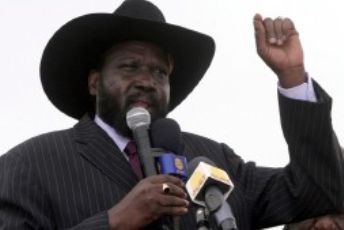South Sudan president blames Khartoum for insecurity
February 25, 2012 (BOR) – South Sudan’s president, Salva Kiir Mayardit accused north Sudan – from which the new country seceded last year – of attempting to turn the world’s youngest country into a failed state.

“But we proved to them we were not going to become a failed state,” Kiir said on a visit to Bor where he witnessed the signing of the Jonglei state transitional constitution and swearing of the state governor Kuol Manyang Juuk on Saturday.
Juba says that Khartoum is aiding the various rebellions in South Sudan in the hope that they will eventually be able to retake control of the oil-fields in Unity and Upper Nile States. North Sudan refutes this, claiming that South Sudan is aiding rebels north of the border, who they fought with during the civil war that led to South Sudan’s separation.
When South Sudan seceded in July last year, it took with it 75% of Sudan’s oil production, leaving Khartoum with a massive hole in its budget and lack of hard currency.
OIL DISPUTE
Kiir repeated Juba’s allegation that Khartoum has stolen some 6 million barrels of South Sudanese oil, worth around $815 million.
In the ongoing oil dispute, which led to South Sudan stopping all production a few weeks ago, Khartoum claims it is owed over $1 billion in unpaid fees, for transporting and refining southern crude for export.
North Sudan admits siphoning off oil and impounding shipments of southern crude before it could leave Port Sudan, saying it was payment in kind for unpaid fees.
North Sudan’s President Omar Hassan Al-Bashir “and his government decided to take our oil without our permission. A person who takes somebody’s property without his permission a thief,” Kiir said.
Bashir has said the shutdown is part of Juba’s attempt to bring about a change of regime in Khartoum by starving the north of the foreign currency it needs to relieve its economic woes.
However, it is South Sudan that analysts say will suffer most from a prolonged period without oil revenues as the country is one of the poorest in the world, with very limited infrastructure, public services and institutional capacity.
MARCH TALKS
The next round of talks mediated by the Africa Union in Addis Ababa are due to restart in March but considering the rhetoric from both sides and their public negotiating positions Juba and Khartoum are miles apart. South Sudan says that according to international norms it should pay less than $1 for each barrel exported through the north arguing that Sudan’s demand for $36 is unjustified..
After the last three rounds of talks on the issues resulted in deadlock, the north has described the next round as “decisive”.
To cope with the loss of 98% of government income South Sudan’s Council of Ministers announced austerity measures this week aimed to reduce the strain the oil shut down will out on public finances.
Kiir warned South Sudanese citizens to work hard for themselves. “We must tie our belts and work for ourselves”, he said.
(ST)
